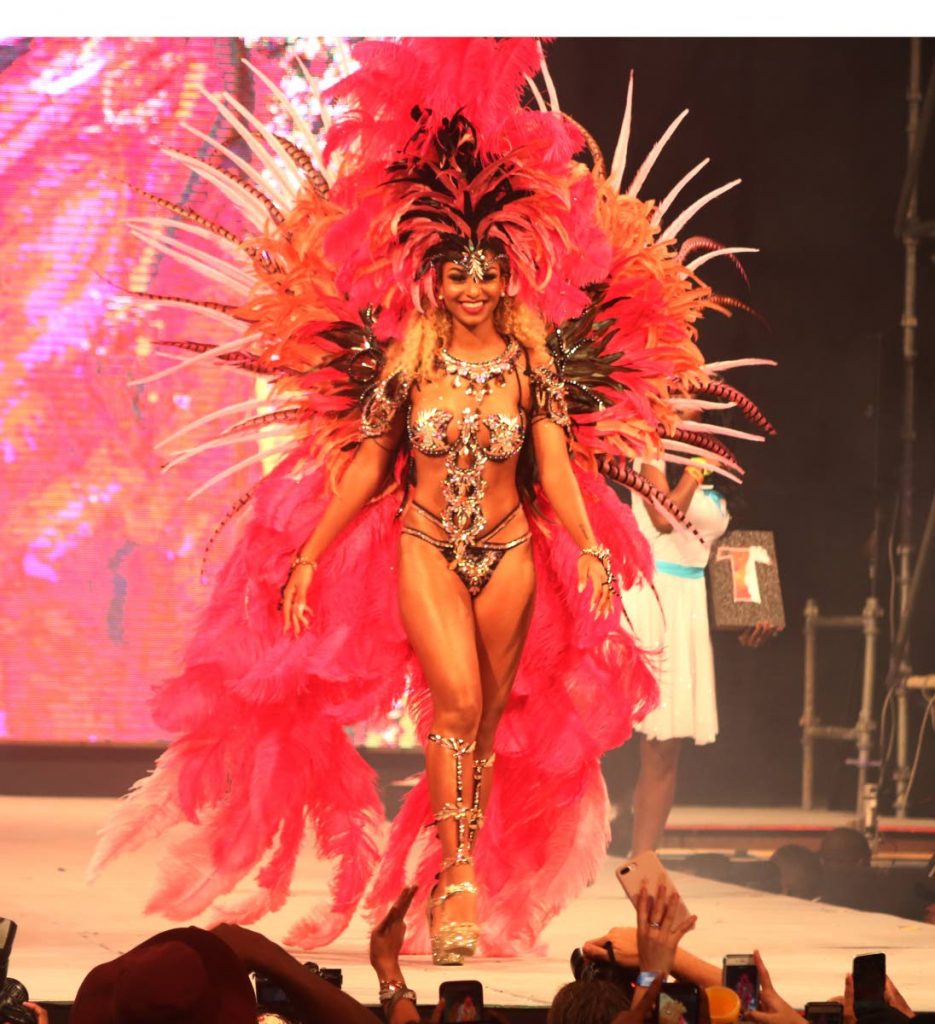SKIMPY MAS: Hard times hit bands

Passion for the mas is perhaps the only thing that keeps Gerry Weekes involved in the increasingly high output-low return endeavour of launching a Carnival band.
Crime, economic recession, difficulty in sourcing material, foreign exchange shortages and sputtering demand and mercurial customers have all contributed to the ongoing challenge of surviving Carnival, Weekes, bandleader of Mas Passion and president of the Carnival Bands Association, told Newsday.
“To be honest, over the last three years we have been suffering losses. A Carnival band is not the gravy flow the public tends to believe it is. The slightest thing determines whether you are profitable. You have to adapt or become extinct,” he said.
Island People, once one of the biggest names on the road, has adopted that philosophy. For the second consecutive year, the band will not be joining the parade. Instead, its general manager Colin Greaves, said, it will be focusing on events.
The downturn wasn’t the primary factor for the group’s decision, he said, but it did feature, especially as contributions from sponsors started to dwindle. “Contributions from sponsors have been depleting over the years. Contrary to popular belief, bands aren’t money-making machines. Partnerships are falling and (sponsors) can’t afford to make the kind of contributions they used to in the past,” he said.
One of the biggest hurdles for masmen is creating costumes, and as material gets harder to source, some bands have to make the difficult decision to sacrifice quality to suit availability.
Weekes said in the last two or three years, there has been a decline in material for costumes because local fabric shops just aren’t supplying it – they say the demand is not there. And while the recession dictates that costume prices need to be lowered to attract masqueraders on a budget, the cost of speciality pieces like feathers has been increasing “astronomically.”
The foreign-exchange crunch adds to the frustration, because most raw material has to be imported.
It gets awkward when bands advertise a prototype and then, after customers have approved, they have to change the design because material can’t be sourced in bulk.
“I know of some bands that have had to discontinue sections or just are not offering at all because they just couldn’t find the material,” Weekes said. Customers, as can be expected, have a negative reaction, he said, but they come around once the challenges are explained.
The cost of costumes has been reduced drastically, he said, to about $1,500-$1,600, but the quality has diminished. And that’s just for the basic package – additional accoutrements cost more, so the final product can end up costing up to $3,000.
“What you are paying $1,500 is basically a bikini and two feathers,” he said.
As the market ultimately starts to whittle, though, attracting enough demand to at least break even is a balancing act. Dean Ackin, managing director of the Tribe Group of Companies, which manages the largest swath of masqueraders, told Newsday that masqueraders were “a bit later in their registrations and more selective in their choice of costume.”
Nevertheless, he was confident that people would still be playing mas, and that there should be a good presence on the road for Carnival.
Weekes said his band started the season late in order to gauge interest, and a lot of masqueraders have been last-minute, especially those who have been waiting on foreign friends and family before making plans. In some ways, this benefits Weekes, who makes his costumes locally, according to demand, so he can temper supply.
Wee International’s operations manager Dwaynelle Matthews said her band had a similar modus operandi.
“Foreign exchange has been kind of difficult. We make do with what we have, but we do have to source a lot of material from outside,” she said. Wee International’s costumes are also made locally. Their season also started out “pretty slow,” she said. The Carnival season is short this year – it’s less than a month until Carnival Monday and Tuesday, and not even a month since Christmas.
“Money is low, but it’s picking up the pace. People are waiting on that January salary,” she said.
Other bands that order in bulk take on an additional risk if their demand doesn’t meet supply and they end up with excess, because they have to place orders so far in advance.
Ackin acknowledged that foreign exchange is a tricky issue. Like every other business, he said, his is facing constraints.
“We are making use of the credit facilities extended by suppliers. They understand the situation in the country and are working with us,” he said.
Cutbacks are also affecting fetes. Ackin noted that consumers were choosing more moderately priced fetes over all-inclusives.
“People are generally being more cautious with their entertainment spend, but still see Carnival as a way to de-stress and unwind,” he said.

Comments
"SKIMPY MAS: Hard times hit bands"